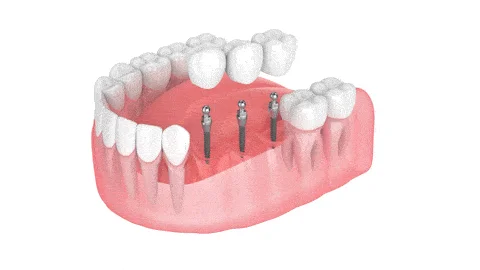What Is a Dental Bridge?
A dental bridge is a custom-made prosthetic that fills the gap created by one or more missing teeth. Anchored securely to the adjacent natural teeth or dental implants, bridges restore your smile by naturally blending with your existing teeth. They are typically crafted from durable materials such as porcelain, zirconia, or porcelain fused to metal, guaranteeing both strength and a natural look.
Benefits of Dental Bridges
-
Restored Functionality: Bridges enable you to chew and speak comfortably, distributing bite forces evenly across your teeth.
-
Aesthetic Improvement: By filling gaps, bridges enhance your smile and maintain the natural shape of your face.
-
Preventing Tooth Movement: They prevent adjacent teeth from shifting into empty spaces, which could lead to misalignment and bite issues.

Types of Dental Bridges
-
Traditional Fixed Bridge: This common type consists of a false tooth (pontic) held in place by dental crowns cemented onto the adjacent teeth. It's ideal when natural teeth are present on both sides of the gap.
-
Cantilever Bridge: Used when there are adjacent teeth on only one side of the missing tooth gap. The pontic is anchored by a single crown on one adjacent tooth.
-
Maryland Bonded Bridge: This bridge uses a metal or porcelain framework bonded to the backs of adjacent teeth, requiring minimal alteration to the neighbouring teeth.
-
Implant-Supported Bridge: Instead of being supported by natural teeth, this bridge is anchored to dental implants surgically placed in the jawbone, providing a stable and durable solution.
The Dental Bridge Procedure
-
Initial Consultation: Our dentists conduct a thorough examination, including X-rays, to assess the health of your teeth and gums and determine the most suitable bridge option.
-
Tooth Preparation: For traditional bridges, the adjacent teeth are reshaped to accommodate the crowns that will support the bridge.
-
Impressions: We take precise impressions of your teeth to create a custom bridge that fits seamlessly.
-
Temporary Bridge: A temporary bridge is placed to protect the exposed teeth and gums while the permanent bridge is being crafted.
-
Fitting the Permanent Bridge: Once ready, the temporary bridge is removed, and the new bridge is adjusted for fit and comfort before being cemented into place.
Caring for Your Dental Bridge

Maintaining good oral hygiene is crucial to prolong the lifespan of your dental bridge. Regular brushing and flossing, especially around the bridge area, help prevent decay and gum disease. Routine dental check-ups allow us to monitor the condition of your bridge and overall oral health.
Patient Before and After Results
Dental Bridge vs. Dental Crown
While both dental bridges and crowns are used to restore damaged or missing teeth, they serve different purposes. A bridge replaces one or more missing teeth by anchoring to adjacent teeth, whereas a crown covers and protects a single damaged or weakened tooth. Below is a comparison to help you understand their key differences:
Feature
Purpose
Number of Teeth
Support System
Tooth Preparation
Cost
Sustainability
Dental Bridge
Replaces one or more missing teeth by using adjacent teeth for support
Typically involves multiple teeth (adjacent teeth and the missing tooth gap)
Supported by natural teeth or implants
Adjacent teeth may need reshaping for crowns
Generally more expensive as it involves multiple teeth. Price starting from €950
Best for replacing missing teeth
Dental Crown
Covers a single damaged or weakened tooth to restore strength and appearance
Involves only one tooth
Placed over an existing tooth
Only the affected tooth is reshaped
Typically less expensive than a bridge.
Porcelain Crown (per tooth) €900
Ideal for restoring a damaged, cracked, or weak tooth
FAQs
1. How long does a dental bridge last?
With proper care and good oral hygiene, a dental bridge can last between 10 to 15 years, sometimes even longer. Regular dental check-ups and professional cleanings help extend its lifespan.
2. How much does a dental bridge cost in Ireland?
The cost of a dental bridge in Ireland varies depending on the type of bridge, materials used, and the complexity of the treatment. Prices typically range from €900 to €1,500 per unit. At The Dental Suite, we offer consultations to assess your needs and our bridge treatment starts from €950.
3. What is the downside of a dental bridge?
While dental bridges are an effective solution for missing teeth, there are some potential drawbacks:
-
Tooth Prep: The adjacent teeth need to be reshaped to support the bridge.
-
Risk of Decay: If not cleaned properly, plaque can accumulate around the bridge, increasing the risk of decay and gum disease.
-
Durability vs. Implants: Bridges typically last 10 years, whereas the Straumann dental implants we do can last a lifetime.
4. Is getting a dental bridge painful?
The procedure is not painful, as it is carried out under local anaesthesia to ensure comfort. Some patients may experience mild sensitivity or discomfort for a few days after the bridge is placed, but this usually subsides quickly.
5. How do I care for my dental bridge?
Maintaining your dental bridge is simple:
-
Brush twice daily with fluoride toothpaste.
-
Floss around the bridge using special bridge floss or interdental brushes.
-
Attend regular dental check-ups for professional cleanings and bridge assessments.
-
Avoid chewing on hard foods (e.g., ice, nuts) to prevent damage.
.png)




